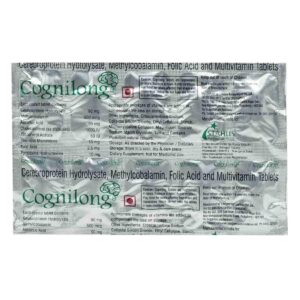GINKGO BILOBA + TAURINE + CEREBROPROTEIN HYDROLYSATE
Ginkgo Biloba: Ginkgo Biloba is a herbal supplement derived from the leaves of the Ginkgo Biloba tree. It has been used for centuries in traditional Chinese medicine and is now commonly consumed as a dietary supplement.
The primary use of Ginkgo Biloba is to improve cognitive function and memory. It is believed to enhance blood flow and improve oxygen and nutrient delivery to the brain. Some studies have suggested that it may also have a potential role in reducing symptoms of anxiety, dementia, and peripheral arterial disease.
The exact mechanism of action of Ginkgo Biloba is not fully understood. It is thought to have antioxidant properties, which help to reduce oxidative stress and protect cells from damage. It may also inhibit platelet aggregation, improving blood flow.
The typical recommended dose of Ginkgo Biloba is 120-240 mg per day, divided into two or three doses. It is important to follow the instructions provided by the manufacturer or consult a healthcare professional for appropriate dosing.
Ginkgo Biloba is generally considered safe for most people when taken in recommended doses. However, it may cause some mild side effects, including headache, dizziness, upset stomach, and allergic skin reactions. Additionally, it can increase the risk of bleeding, especially when used in combination with anticoagulant or antiplatelet medications. Therefore, individuals taking such medications should use caution and consult with their doctor before starting Ginkgo Biloba.
It is important to note that Ginkgo Biloba may interact with certain medications, such as blood thinners, antidepressants, and anticonvulsants. Pregnant and breastfeeding women should also avoid using Ginkgo Biloba due to limited data on safety in these populations.
As with any supplement, it is crucial to discuss the use of Ginkgo Biloba with a healthcare professional to ensure it is appropriate for your specific health condition and to monitor for any potential interactions or side effects.
Taurine: Taurine is an amino acid-like compound that is naturally present in the human body. It is also found in various foods such as meat, fish, and dairy products. It can be obtained as a dietary supplement as well. Taurine is widely used for its potential health benefits.
Taurine has several important functions in the body, including acting as an antioxidant, regulating calcium levels, and supporting the development and function of the central nervous system. It also plays a key role in heart health and the production of bile, which aids in the digestion of fats.
Taurine is commonly used as a dietary supplement to improve athletic performance, boost energy levels, and enhance mental focus and cognition. It is also used to support cardiovascular health, manage diabetes, and treat liver diseases.
The mechanism of action of taurine is not fully understood, but it is believed to exert its effects through various pathways. It may act as an antioxidant, helping to protect cells from damage caused by free radicals. Taurine also has a role in the regulation of neurotransmitters, such as GABA, which can help promote a sense of calm and relaxation.
The recommended dose of taurine varies depending on the specific health condition or purpose. For general supplementation, doses typically range from 500 to 3000 mg per day. However, it is important to consult with a healthcare professional for personalized dosing recommendations.
Taurine is generally considered safe for most individuals when taken in appropriate doses. Side effects are rare and usually mild, but can include stomach upset, diarrhea, and headache. It is important to note that taurine should be used with caution in individuals with kidney problems or those who are taking certain medications, such as lithium.
As with any supplement or medication, it is important to consult with a healthcare professional before starting taurine supplementation, especially if you have any underlying health conditions or are taking other medications. They can provide guidance on appropriate dosing and help monitor for any potential interactions or side effects.
Cerebroprotein Hydrolysate: Cerebroprotein Hydrolysate is a medication that is derived from animal brain tissue. It is used for the treatment of a variety of neurological conditions, including Alzheimer’s disease, stroke, traumatic brain injury, and cognitive impairments.
The exact mechanism of action of Cerebroprotein Hydrolysate is not fully understood. However, it is believed to work by promoting neuronal growth and repair, improving brain metabolism, and reducing inflammation in the brain.
The recommended dose of Cerebroprotein Hydrolysate varies depending on the patient’s condition and the severity of symptoms. It is typically administered through intramuscular or intravenous injections. The duration of treatment also varies and can range from several weeks to several months.
Like any medication, Cerebroprotein Hydrolysate may have side effects. Common side effects include headache, dizziness, gastrointestinal disturbances (such as nausea and vomiting), and allergic reactions. Rarely, it may cause more serious side effects such as seizures or hypersensitivity reactions. It is important to monitor patients closely for any adverse reactions and to discontinue use if necessary.
It is important to note that the use of Cerebroprotein Hydrolysate is controversial, and its efficacy has not been convincingly proven in clinical trials. More research is needed to fully understand its benefits and risks. As always, it is essential to consult with a healthcare professional before starting any new medication.

